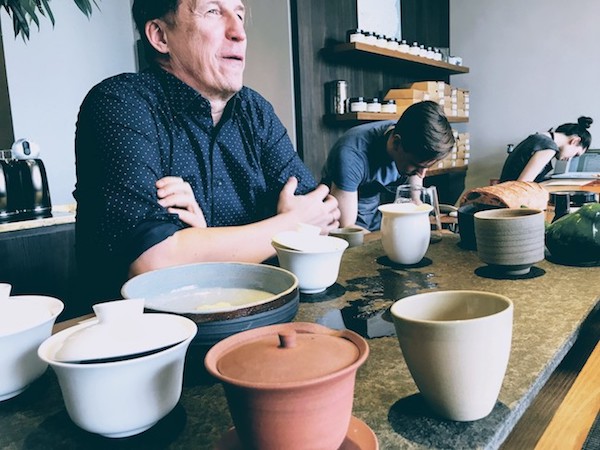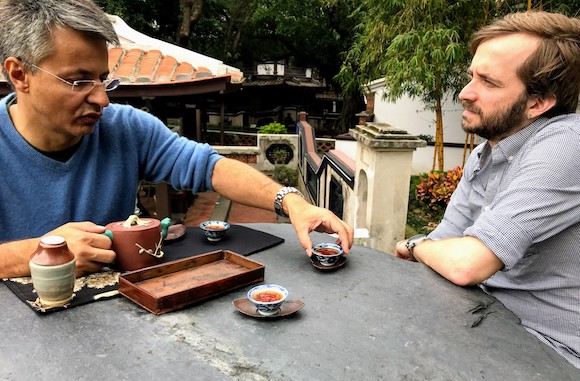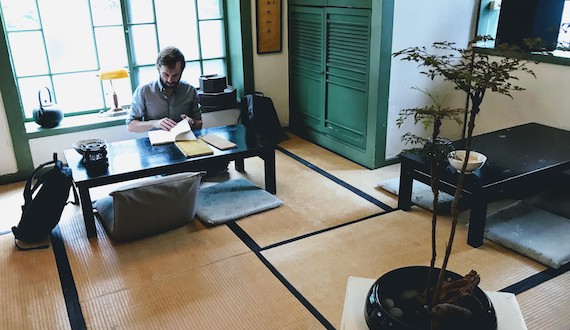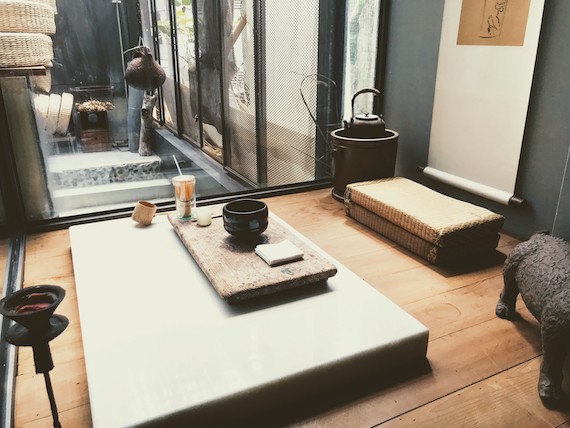A Tea Trip for the Ages

Gabor of Zhao Zhou, Budapest
“Tea is a religion of the art of life.” ~KakuzÅ Okakura, The Book of Tea
By Leo Babauta
Today I am finishing an unplanned around-the-world trip with my friend Tynan that featured some of the best tea experiences I’ve ever had. The generosity of the tea shop owners and tea enthusiasts I met have just blown me away, and I’m left with a beautiful feeling of lingering tea taste in my mouth, a calmness in my body, and a warmness in my heart.
The trip ended with a three-hour tea tasting at Zhao Zhou in Budapest, perhaps the best Chinese tea shop in Europe (if you’re a fan of Chinese tea, it’s the best tea shop in Europe period). In this shop, with gorgeous tea ware made in Hungary and China, the owner, Gabor, served me and Tynan some amazing oolongs and pu-erh teas and talked to us about Tibetan Buddhism, ancient tea trees, Zen masters, and the “body feel” that a tea leaves you with. I adore Gabor and found him to be one of the most generous people I’ve met.
Gabor is friends with Michael, the owner of a tea shop in Taipei called Stop By Tea House where we’d been just two days before. We walked the streets of Taipei looking for good tea, and found it in abundance:
-
We had tea with a tea blogger named Stephane, a Frenchman who’s been living in Taiwan for 15 years, who served us old pu-erh in an amazing garden in New Taipei City, and talked to us of the feeling that tea leaves you with even after you’re done drinking, and of the history of the gardens we were in.
-
We lounged for hours at Wistaria Tea House, a historic spot where political dissidents used to gather decades ago, and where now you can sit on tatami mats, have tea snacks like pineapple cake and nuts, and drink beautiful high mountain oolongs.
-
Stop By Tea House, just a 10-minute walk from Wistaria, has one of the most eclectic collections of incredible Chinese and Japanese tea ware I’ve seen, and some excellent tea as well. In the basement, there’s a beautifully unusual space for tea parties, where tea is floated to you on a lighted river that’s carved into the floor. There’s also a tiny space set up in the Japanese tea style that is absolutely perfect. The owner, Michael (I’m sure that’s just the name he gives to English speakers), gave us several free teas as we left, as a gift, with such a kindness that you can’t believe.
-
We spent over an hour drinking dong ding oolongs at the Chong Er tea shop with a Taiwanese woman who was born and raised in the town where dong ding oolongs come from, and has been drinking that tea her entire life. She talked to us of her love for Korean culture, of Buddhist temples, of her home town, and in the end refused to let us pay for the tea we drank, telling us to “take it easy,” and shooing us out of her shop before we could give her a single dime.

Stephane and Tynan in a Taiwanese garden
Before we hit Taiwan, Tynan and I spent a couple days in Tokyo, going twice each to our favorite two tea houses in the city: Higashi-ya and Ippodo. They have exquisite examples of Japanese gyokoro and matcha tea, with delicious Japanese tea sweets to match. Higashi-ya is gorgeously designed, with servers who whisk the matcha in a blur, and serve it so elegantly you feel your heart might burst.
Now that I’m flying home to California, I’m hoping to stop by the tea house that started my tea journey, and my friendship with Tynan: Samovar Tea. The owner, Jesse, has a generosity of spirit to match the others I’ve met on this trip, and he’s now one of my best friends as well. With a simple cup of sencha he served me eight years ago, he gave me the gift of appreciation of something that connects me to so many people, to trees and farms and farmers, to cups and food and water, to everything around me, and to myself.

Wistaria Tea House, Taipei
We honestly didn’t plan for this to be such an epic tea trip, nor could we have guessed what kind of generosity of spirit we would encounter in Japan, Taiwan and Budapest. But the trip turned out to be like the brewing of a good pot of tea: every steeping is different, yielding unexpected flavors, giving an unfolding experience that you can’t predict and that you can’t hold onto, but that you can savor with contentment and gratitude nonetheless.
“Teaism is a cult founded on the adoration of the beautiful among the sordid facts of everyday existence.” ~KakuzÅ Okakura, The Book of Tea
